
In 2024, How To Remove the Two Factor Authentication On iPhone 14

How To Remove the Two Factor Authentication On Apple iPhone 14
Want To Remove the Two Factor Authentication? Check Out This Guide
Continuous technology innovation has introduced many advanced encryption and security methods to protect data from hackers. With these innovations, companies like Apple and Google have introduced the two-factor authentication process to protect user data.
But sometimes, this security method becomes a hassle to access your data daily, due to which many users try to remove it. That is why, in this article, we have discussed how you can remove iCloud two-factor authentication easily.
- Part 1: What Is Two-Factor Authentication and How Helpful It Is
- Part 2: Can You Remove the Two Factor Authentication iCloud at Anytime
- Part 3: How To Remove the Two-Factor Authentication Within 14 Days
- Part 4: iPhone Apple ID Got Locked? Here’s a Reliable Tool To Get It Unlocked Without Passcode

Part 1: What Is Two-Factor Authentication and How Helpful It Is
Protecting users’ devices and online accounts is one of the major responsibilities of tech companies like Apple. Due to this, they have added multiple security features, including two-factor authentication. Thus, if you create an Apple ID, you can see a two-factor authentication option that adds an extra layer of security.
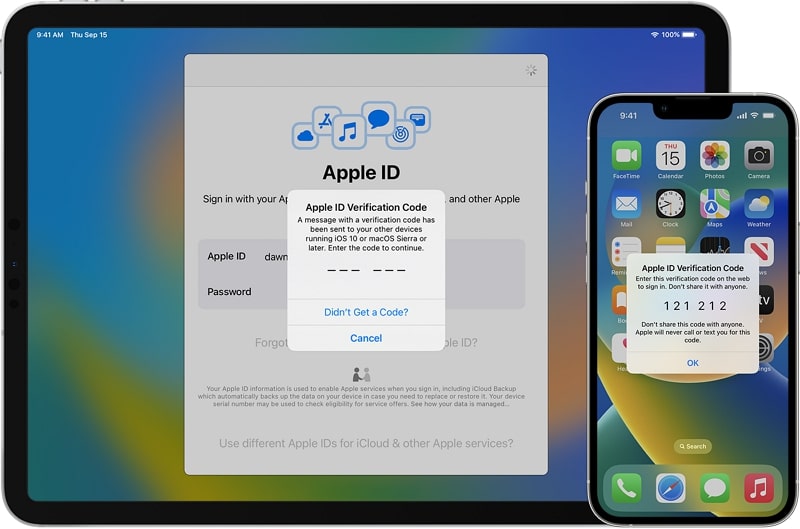
2FA is activated when the user provides the password to log into the Apple ID or software through a new device, and it acts as a second layer for account security. Apple ID or any software containing sensitive data cannot be accessed without it. This method provides a higher security level than single-factor authentication. To understand more benefits of this security system in detail, check the following points:
- Protection From Password Theft: 2FA acts as an additional security level. It protects your accounts and devices in case your password is leaked.
- Migrations of Unauthorized Assets: Online banking applications use 2FA to protect users from unauthorized bank transfers. If someone accesses their app, this is a beneficial security measure.
- Protection on Multiple Services: Platforms, including social media, banks, and cloud storage, use 2FA. It means that 2FA can be used in various digital aspects.
Part 2: Can You Remove the Two Factor Authentication iCloud at Anytime
Many people use 2FA globally to protect their personal information and devices from hackers and unauthorized access. However, in some cases, users may want to remove two-factor authentication iCloud for multiple reasons. This includes scenarios in which their device is lost or damaged or if they have found a better security option than this one.
Moreover, there is one important key point to note: Apple has removed the feature of deactivating 2FA from the Apple ID. It means you need to think twice before activating this feature on your Apple ID because it cannot be reversed. For the following reasons, Apple has taken this initiative:
- Enhanced Security: By removing the deactivation option for 2FA, Apple is trying to strengthen its account security to ensure that no one can access its user’s data.
- Reducing Vulnerabilities: Allowing users to deactivate 2FA could cause vulnerabilities in the Apple ecosystem that can be a weak point for protecting users’ data. That is why Apple has removed the deactivation option to stop malicious actors from taking advantage of this vulnerability.
- Encouraging Security Awareness: To make Apple users more security conscious, Apple has made it difficult on purpose to remove 2FA. It helps users to be more confident in Apple services and products.
- Minimizing Mistakenly Steps: If users mistakenly remove the 2FA, their accounts and devices are at risk of being accessed without proper authentication. To avoid such an issue, the deactivation option of 2FA is removed.
Besides all these reasons, there is still some good news for those who want to remove the two-factor authentication iPhone to use other security options. The good news is that Apple allows users to remove 2FA for a limited time after activation.
Part 3: How To Remove the Two-Factor Authentication Within 14 Days
As explained in the last part, Apple has made removing the 2FA option from Apple ID challenging for several security reasons. Thus, if you want to remove 2FA from your Apple ID, you have only 14 days after activating this feature. To understand how to disable iCloud two-factor authentication within this given time, check the following steps:
- Step 1. Once you have activated the 2FA feature, your 14-day grace period will start eventually. To deactivate this, open the enrollment email you received from Apple regarding 2FA on your Apple ID.
- Step 2. Scroll to the bottom of this email and select the link or button to return to your account security & settings section. There, follow the on-screen instructions to deactivate the 2FA of your Apple ID.
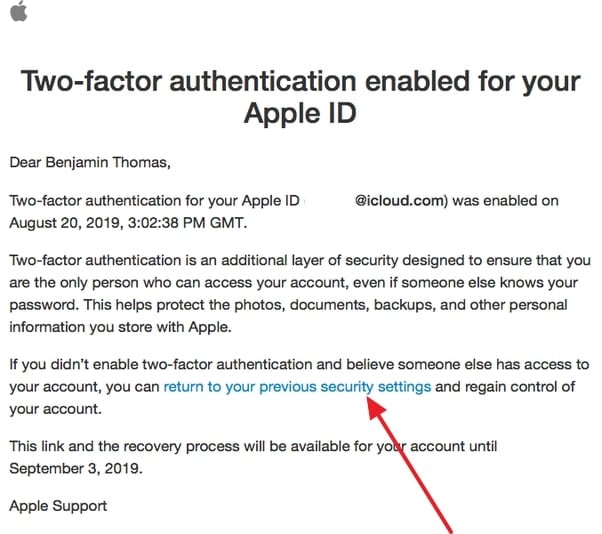
Part 4: iPhone Apple ID Got Locked? Here’s a Reliable Tool To Get It Unlocked Without Passcode
If you mistakenly got your Apple ID locked due to entering the wrong password multiple times, there is no need to stress it out. It is a common issue that many people forget their Apple ID password and cannot access it. Due to this, we have got you a perfect solution to unlock your Apple ID without a passcode.
This solution is the Wondershare Dr.Fone - Screen Unlock (iOS) tool specially designed to help users remove their iPhone and iPod lock screens. It is compatible with the latest iOS devices and assists in removing various types of lock screens, including Touch ID and Face ID.
Key Features
- This iOS screen unlock tool assists users in bypassing MDM without data loss and other technical errors.
- iCloud activation lock and iTunes backup encryption can be bypassed without a password in just a few steps.
- iPhone 15 and the latest versions of iOS 17/iPadOS 17 are supported by this tool to help users professionally.
Simplified Steps for Unlocking Apple ID With Wondershare Dr.Fone
To help you use this AI-powered screen unlock tool for unlocking the Apple ID without a password, follow the process we have mentioned below for your ease:
- Step 1. Access the Toolbox and Choose the Respective Option
Initiate the process by accessing Wondershare Dr.Fone’s latest version on your computer and tapping on the “Toolbox” option from its left side toolbar. Following this, choose “Screen Unlock” from the list of tools and tap “Remove Apple ID” in the next window.

- Step 2. Make Sure That the Apple iPhone 14 Is Connected to the Computer
Then, connect your Apple iPhone 14 to your computer using a USB cable so that you can see its connectivity status. Once the status is displayed on a new window, hit the “Unlock Now” button to proceed. Answer some questions that are asked by the platform, and with this, ensure that your device’s “Screen Lock” and “Two-Factor Authentication” are enabled or disabled.
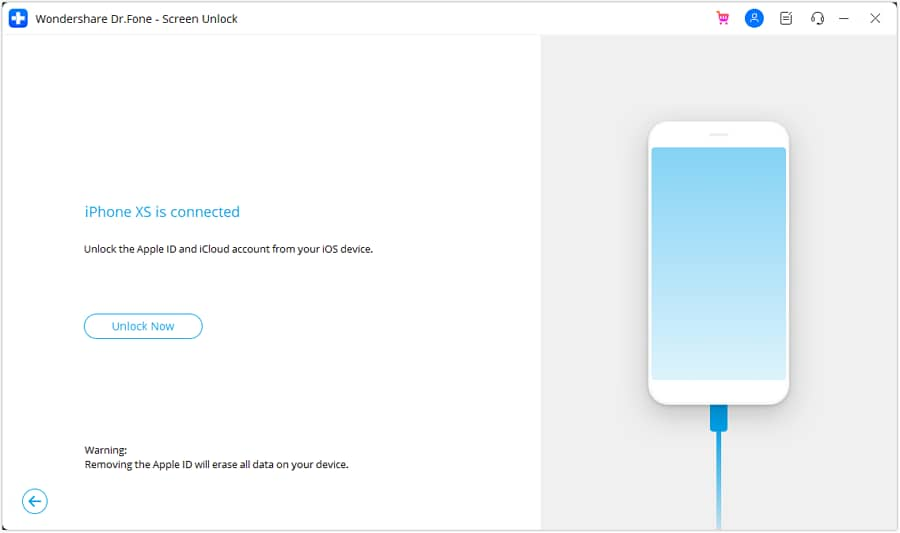
- Step 3. Select the System Version and Proceed Ahead
In this step, enable Recovery Mode by following the on-screen instructions. It will help the platform detect the connected device model, with which you will need to select “System Version.” Afterward, you can hit the “Start” button to proceed ahead.
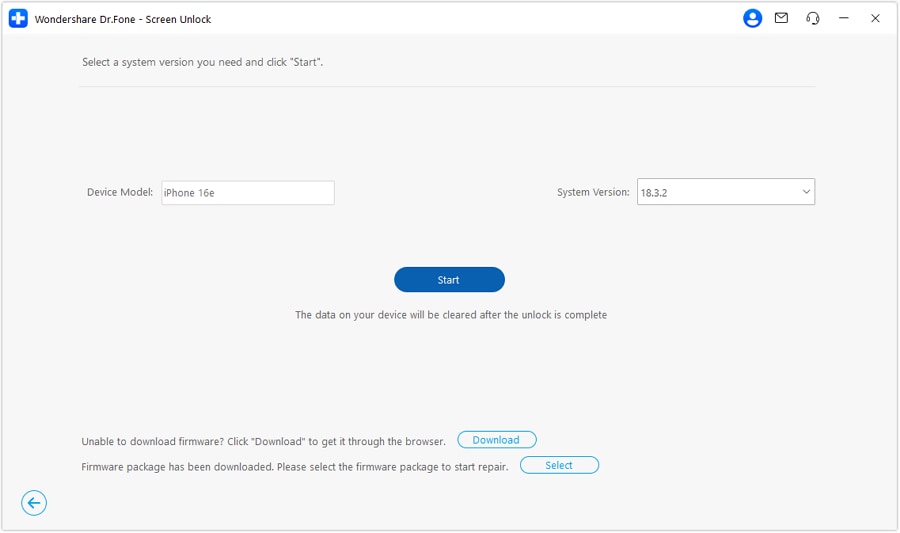
- Step 4. Start the Apple ID Unlocking Process
The respective iOS firmware will download according to the Apple iPhone 14 device model and system version. After it is downloaded, the platform will verify it for you, based on which you can tap the “Unlock Now” option to get your Apple ID unlocked successfully.
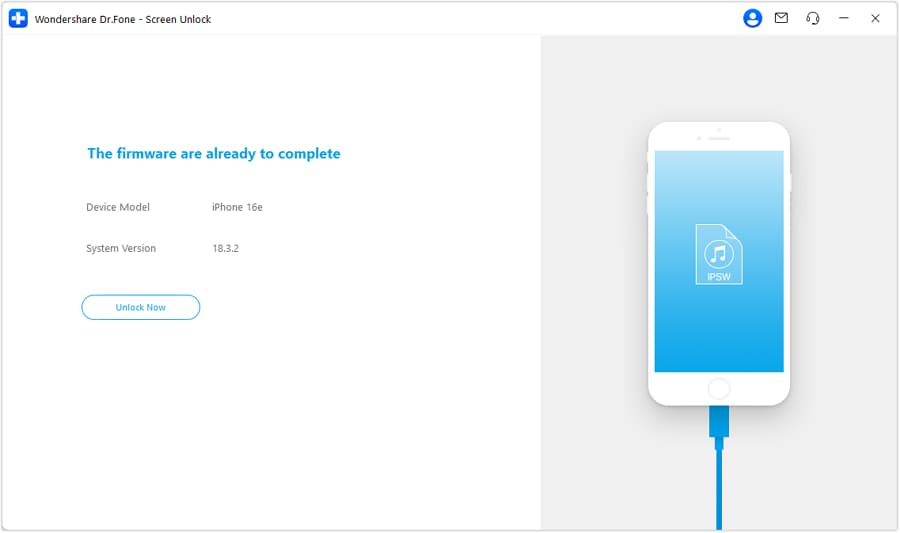
Conclusion
With this, we hope you understand how to disable iCloud two-factor authentication. However, remember that doing this is only possible within 14 days of a grace period. If this period is over, you cannot remove 2FA from your Apple ID.
Moreover, if you have locked your Apple ID passcode, using Wondershare Dr.Fone to unlock it can be the perfect option. While using this tool, you also don’t have to worry about screen locks on different iOS devices. This is because the innovative algorithms integrated in this tool make it easier to use for unlocking the Apple ID or screen lock.
Apple ID is Greyed Out On Apple iPhone 14: How to Bypass?
An Apple ID functions as a vital passageway to a diverse array of Apple services. These encompass iCloud, the App Store, iTunes, and other offerings. It serves as a unified account that enables users to connect with different Apple products and services. Yet, even with its significance, Apple ID users can encounter various issues that may disrupt their experience.
One such problem is the daunting phenomenon of the Apple ID being greyed out. It also prevents users from accessing essential features and services. Thankfully, solutions to these issues do exist. Understanding the root cause and implementing the appropriate solution is crucial. This article aims to delve into one of the most effective methods to tackle the troubling problem of the Apple ID greyed-out issue.
Part 1: Why Did the Apple ID Greyed Out? Coming to the Reasons
Dealing with a greyed-out Apple ID can undoubtedly lead to a frustrating experience. It also hinders your access to essential Apple services. Before delving into the solutions, understanding why Apple ID is grayed out is essential. Several factors can contribute to the greying out of your Apple ID, and some of these are given below:
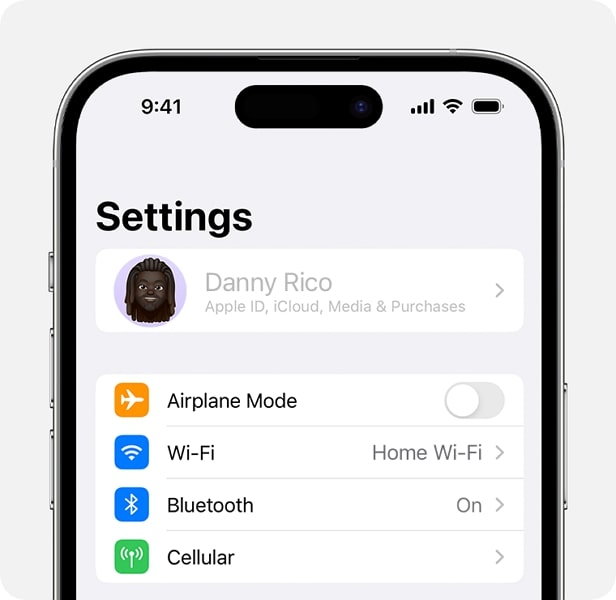
1. Apple ID Signed In on Another Device
One common reason for the Apple ID to appear greyed out is when it is actively signed in on another device. This often happens when users forget to log out of their account on a different Apple device. It leads to a conflict that prevents the smooth functioning of the Apple ID.
2. Incorrect Password Attempts
Multiple failed attempts at entering the Apple ID password can trigger security measures. It can temporarily disable the account, causing it to grey out. This security measure is created to safeguard the account against unauthorized entry. Nevertheless, it may limit access to the Apple ID in the event of multiple incorrect password entries.
3. Network Connection Issues
Fluctuating or unstable network connections can also contribute to the Apple ID greying out. When the Apple iPhone 14 device is unable to establish a stable connection with Apple’s servers, it may manifest as an unresponsive or greyed-out Apple ID. Thus restricting access to various Apple services and features.
4. Software Glitches or Bugs
Software inconsistencies within the Apple iPhone 14 device’s operating system can lead to temporary malfunctions. That results in the greying out of the Apple ID. Such glitches can arise due to software updates or incomplete installations. It can also happen due to conflicts between different applications.
5. Apple Server Maintenance or Outage
Periodic maintenance or unexpected server outages on Apple’s end can disrupt the functionality of the Apple ID. As a result, you experience temporary Apple ID grey-out issues. During such occurrences, users may experience difficulties accessing their Apple ID.
Part 2: Finding the Proper Solutions to Apple ID Greyed Out [Highly Effective]
Encountering a greyed-out Apple ID can be a daunting experience. However, there exist many resolutions to this issue that can be implemented. This article aims to guide you through several effective remedies that can help resolve the problem. By following the solution outlined below, you can fix the Apple ID greyed out on iPad:
Solution 1: Checking Screen Time Passcode Settings
In some instances, the greying out of the Apple ID can be attributed to specific settings, such as the Screen Time passcode. Checking and adjusting the Screen Time passcode settings can help ensure your Apple ID is not inadvertently restricted. Follow the steps below to check and manage your Screen Time passcode settings for fixing the Apple ID that is greyed out in the settings option:
- Step 1: Access the Settings app on your Apple iPhone 14 and tap “Screen Time.” Here, select “Content & Privacy Restrictions” and move down to the “Allow Changes” section.
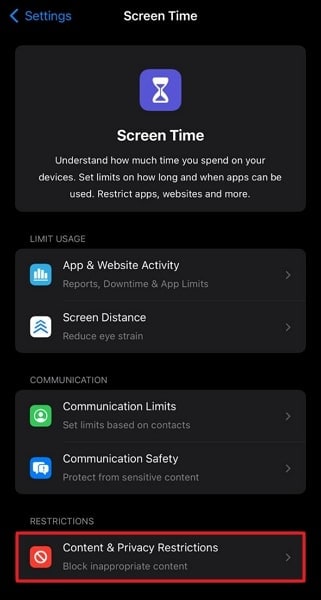
- Step 2: Now, navigate to “Account Changes” and ensure it is set to “Allow.” Afterward, check if the Apple ID is working normally again.
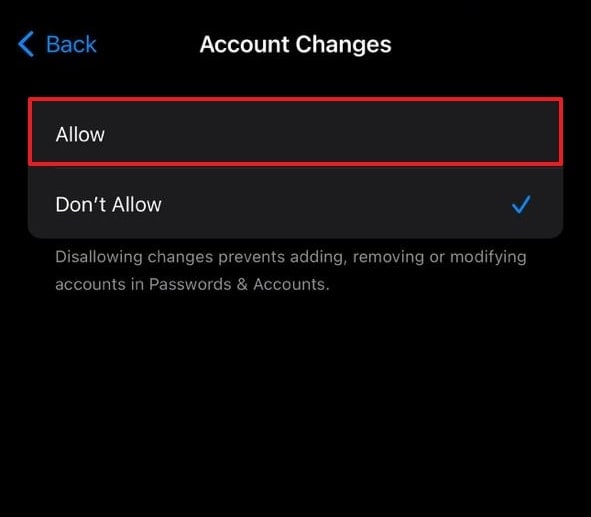
Solution 2: Checking Apple System Status Page
Checking the Apple System Status page can help determine if the problem lies at Apple’s end. The greying-out issue can be related to any ongoing server maintenance or outage. By staying informed about the status of Apple services, you can ensure that you can take the necessary steps. Follow these steps to check the Apple System Status page to check the Apple ID greyed-out status:
- Step 1: Start by accessing a web browser and opening the Apple System Status page. Here, look for the entry named “Apple ID.”
Step 2: When the indicator is green, there are no issues at the server’s end. Yet, if it turns orange or red, it signifies a server problem, and you’ll need to be patient until it’s resolved.
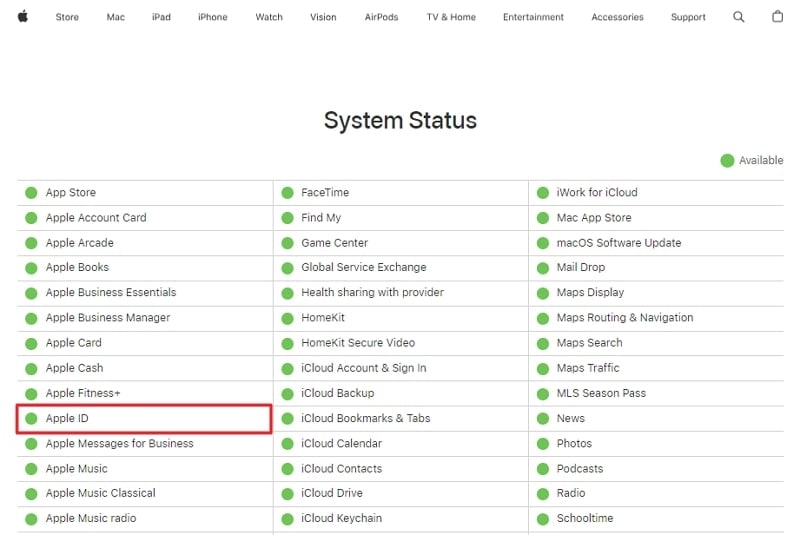
Solution 3: By Turning Off Screen Time
If the greying out issue persists and is related to Screen Time settings, disabling Screen Time can serve as a potential solution. By turning off Screen Time, you can potentially resolve any conflicts or restrictions that might be causing the greying out of your Apple ID.
This simple solution can help restore full access to your Apple ID and associated services. To disable Screen Time and fix Apple ID greyed out on iPad, follow these simplified step-by-step instructions:
- Step 1: From the Settings of your Apple iPhone 14, access “Screen Time.” On the following screen, scroll to the last option, “Turn Off Screen Time.”
- Step 2: Now tap “Turn Off Screen Time” and provide the screen time passcode for confirmation. Finally, confirm the action by selecting “Turn Off Screen Time” in the pop-up confirmation message.
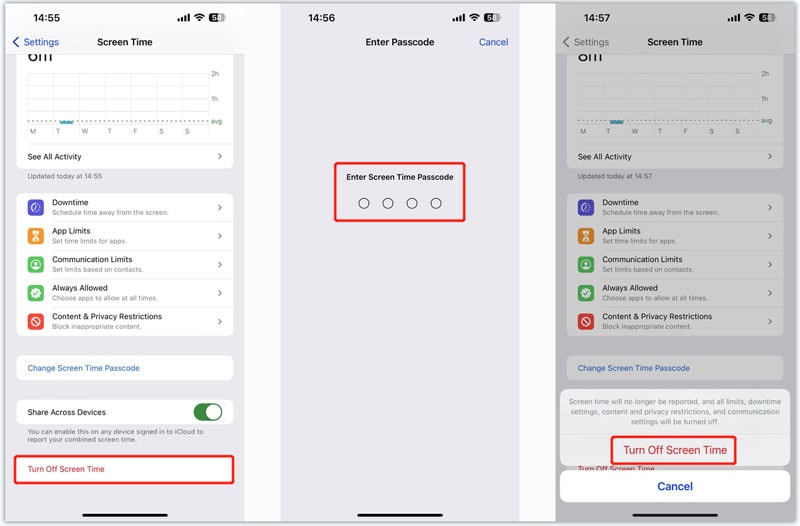
Solution 4: Restarting the iOS Device
Performing a simple restart on your iOS device can resolve various software-related glitches. It also includes glitches behind the greying out of the Apple ID. By restarting your iOS device, you can refresh the system’s processes. This simple yet effective solution can help restore normal functionality to your device. Follow these steps to restart your iOS device to fix the Apple ID grayed-out problem:
- Step 1: Press and hold the Power button and either the Volume Up or Volume Down button simultaneously. Keep holding these two iDevice buttons until the “Slide to Power Off” slider appears.
- Step 2: Drag the slider towards the right to power off your device. Allow a few moments to pass before using the “Side” button to switch on your Apple iPhone 14.
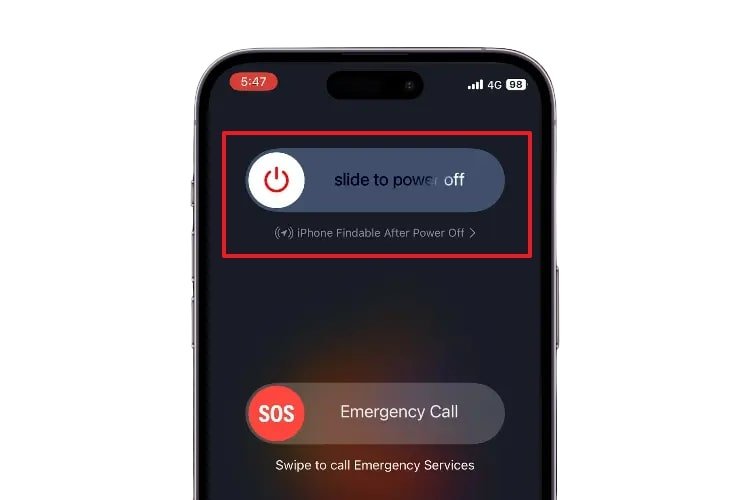
Solution 5: Checking Internet Connectivity Status on Device
Ensuring a consistent and reliable internet connection is crucial for the optimal performance of your Apple ID. If you’re utilizing Wi-Fi, be sure to connect to a dependable network to guarantee seamless functionality. When utilizing cellular data, verify your signal strength and confirm the availability of an active data plan. A stable internet connection is of utmost importance for the effective operation of your Apple ID.
Solution 6: Reset All Settings Within iOS Device
Resetting all settings on your iOS device can effectively resolve persistent software-related issues. This means if conflicts in settings where the root of Apple ID is grayed out, the problem would be resolved. Be aware that initiating this action will restore all settings to their original defaults while preserving your data. Follow the steps outlined below to reset all settings on your iOS device:
- Step 1: To start, you access the Settings app and navigate to the “General” settings tab. There, scroll to the bottom till the last option and tap on “Transfer or Reset iPhone.”
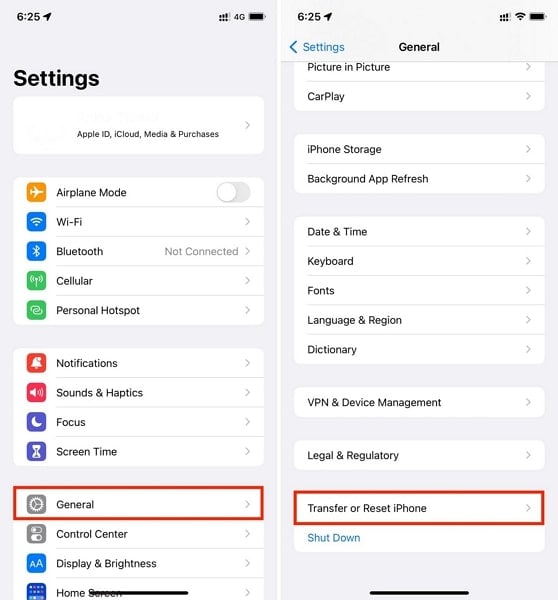
- Step 2: Navigate to the next screen and tap “Reset.” From there, choose the option for “Reset All Settings.” A prompt will appear, requesting your device passcode for verification. Once entered, proceed with the “Reset All Settings” to finalize the process.
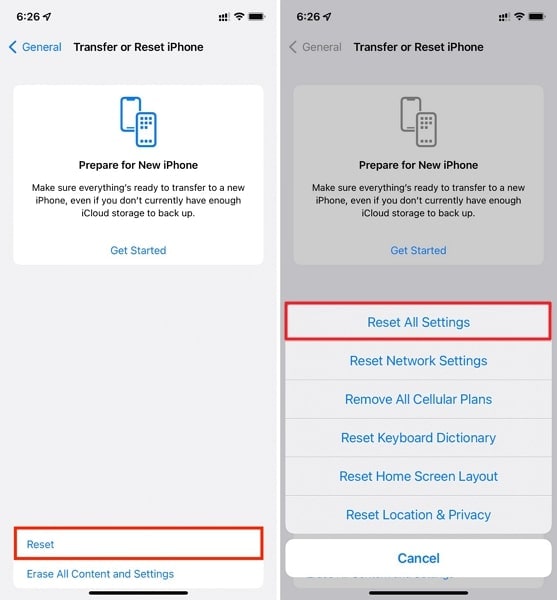
Solution 7: Contact Apple Customer Support
If the previous solutions have not resolved the issue of your Apple ID greying out. It may be necessary to seek help from Apple’s customer support. Apple’s support team can provide personalized guidance and troubleshooting steps.
By contacting Apple’s customer support, you can receive expert help. The support team can offer tailored solutions and further guidance. This can help you regain access to your Apple ID and associated services.
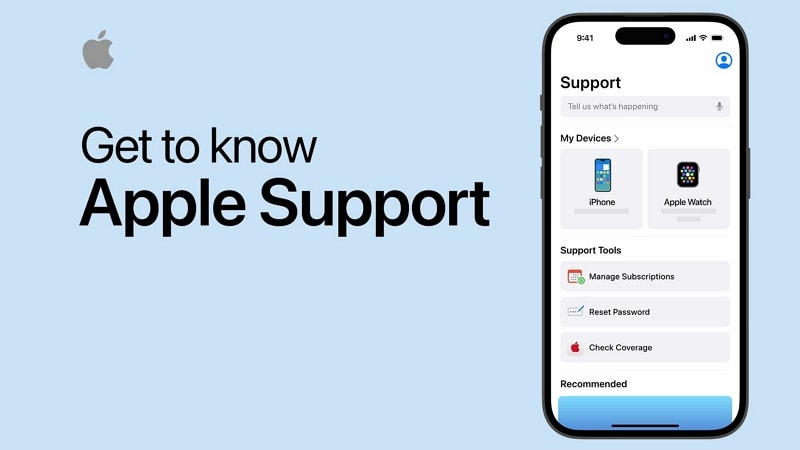
Part 3: Advanced Solution: Try Wondershare Dr.Fone Screen Unlock if the Previous Solutions Are Ineffective
You have implemented all the methods mentioned above, and your Apple ID greyed-out issue is not resolved. It means you need a more efficient solution. Wondershare Dr.Fone is one of the most effective and solid solutions to fix the Apple ID greyed-out issue. Without resolving this problem, your Apple ID would be of no use; that is the main functional unit in your iOS devices.
Dr.Fone does this resolving procedure through its powerful Screen Time Passcode unlock feature. It is also a primary remedy to unlock the locked screen of your Apple devices. Moreover, this tool can bypass the iCloud activation lock and Apple ID without any password requirement. Through this Screen Unlock tool, you will be able to resolve your issue quickly and without any technical knowledge.
Key Features of Wondershare Dr.Fone
Dr.Fone - Screen Unlock (iOS)
Unlock iPhone/iPad Lock Screen Without Hassle.
- Simple, click-through, process.
- Unlock screen passwords from all iPhone and iPad.
- No tech knowledge required, everybody can handle it.
- Supports the latest iOS version fully!

4,395,217 people have downloaded it
- This enhanced and powerful iDevice toolkit can also help unlock Apple ID for iOS 17 devices.
- It can also bypass the MDM or remove the MDM profiles to allow you to use your Apple iPhone 14 normally.
- You can unlock your Apple iPhone 14 or iPad screen lock without a password if you can’t remember it.
Fix Apple ID Greyed Out Issues by Unlocking Forgotten Screen Time Passcode
Wondershare Dr.Fone is an easy-to-use software with a simple guide to fix your Apple device issues. Here is how to fix Apple ID greyed-out issues with Wondershare Dr.Fone - Screen Unlock (iOS):
- Step 1: Access the Screen Unlock Tool
You need to start the process by opening Wondershare Dr.Fone and moving towards the “Toolbox” section. At that location, select “Screen Unlock” from the options provided. Then, select the “iOS” option from the window to define the type of your device.

- Step 2: Start the Unlocking Process and Connect Your iDevice
You will find yourself in a list of options from where you need to continue with the “Unlock Screen Time Passcode” option. Next, connect your iOS device to the computer via a USB cable. Then, wait for Wondershare Dr.Fone to detect your Apple iPhone 14.
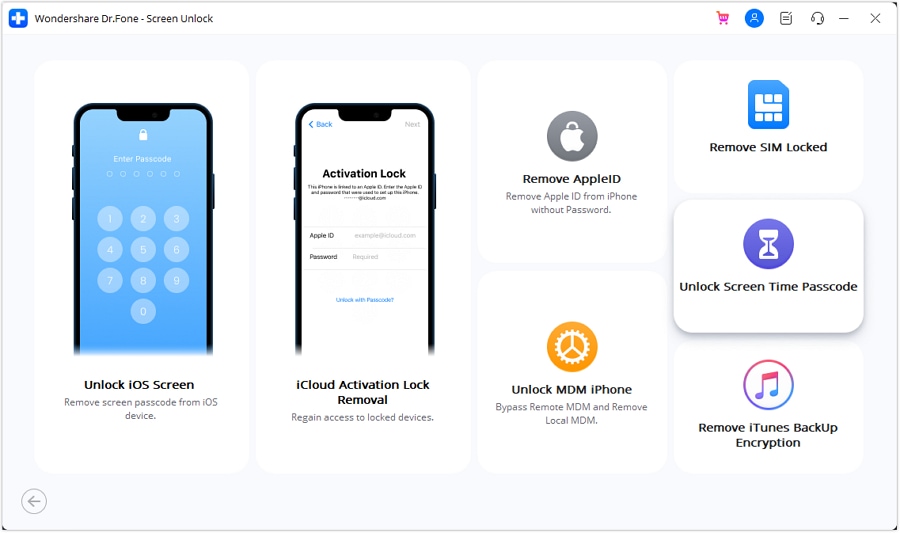
- Step 3: Unlock Your iDevice and Toggle off Find My Feature
After the connection, select the “Unlock Now” button to unlock your screen time passcode, and turn off the “Find My iPhone” feature by following the on-screen instructions. Completion of the screen time passcode unlocking process will start to display after clicking the “OK” button. Finally, after the completion message, hit “Done” to end the entire operation.
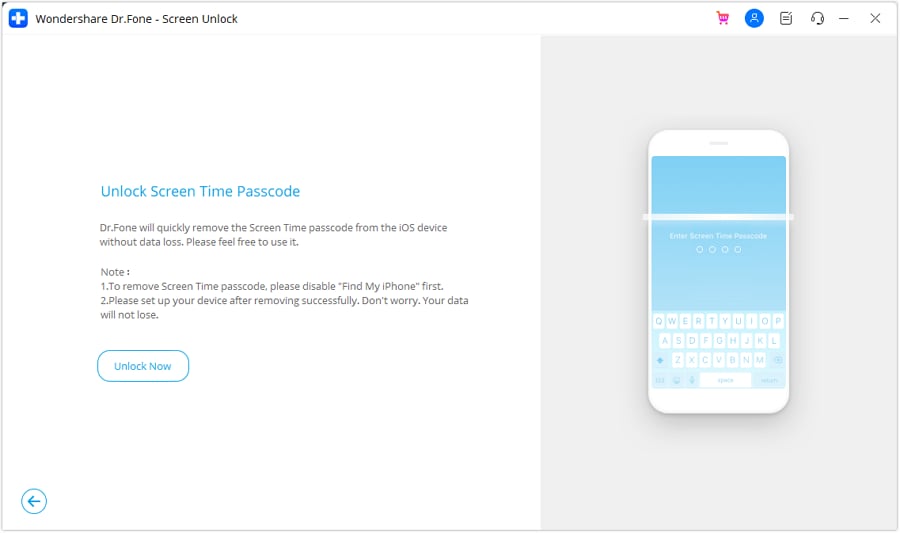
Final Words
Throughout this article, we have explored the perplexing issue of the Apple ID grayed out in settings. It can hinder the smooth functioning of your iOS device and access to various Apple services. By going through the root causes behind this problem, we have outlined several solutions. These can help users address the issue and regain access to their Apple ID.
We recommend that users diligently follow the steps provided in each solution. So that they can identify and rectify the specific cause of the problem. However, in cases where the issue persists, we highlighted the significance of using Wondershare Dr.Fone. It offers a specialized Screen Time Passcode Unlock feature. Moreover, this ensures the smooth operation of Apple ID and associated services.
How to Change Credit Card on Your Apple iPhone 14 Apple ID and Apple Pay
Apple’s ecosystem offers convenience with services like Apple ID and Apple Pay. Managing your digital life has never been more convenient. In this interconnected system, your credit card plays a crucial role. It’s essential to understand that your credit card details can be associated with both your Apple ID and Apple Pay, each serving unique functions.
In this comprehensive guide, we’ll learn how to change the credit card on Apple ID and Apple Pay. Additionally, we will introduce you to a helpful tool for unlocking your Apple ID if you ever encounter access issues.
Part 1: 3 Ways To Change the Credit Card on Apple ID
We’ll explore 3 different methods to change the credit card details associated with your Apple ID in this section. These methods allow you to update your payment information effortlessly, ensuring uninterrupted access to Apple services.
Way 1: Update Credit Card on iPhone/iPad
The first method involves updating your payment information directly from your Apple iPhone 14 or iPad’s settings. This method is convenient for those who prefer managing their Apple ID details on their iOS devices. Here is how to change your credit card on Apple ID via iPhone or iPad:
- Step 1: Begin by launching the Settings app on your device and then touch your name to enter your Apple ID settings. Afterward, choose the “Payment & Shipping” option to move ahead. In addition, log in using your Apple ID credentials if necessary.

- Step 2: Next, press “Add Payment Method” and provide information for your new payment method. Once you’ve entered all the required details, tap “Done” to confirm and save your updates.

- Step 3: To remove the old payment method, tap “Edit.” Now, locate the old payment method you want to delete and tap the “Red Delete” button next to it. Confirm the deletion by tapping “Delete.”

Way 2: Change Credit Card on Mac
Now, we shift our focus to those who prefer managing their payment information on their Mac. Changing your credit card details from Mac’s settings is a straightforward and easy process. Therefore, using the following steps, you can learn how to change your credit card on Apple ID without any errors:
- Step 1: Start by opening the App Store on your device. Then, in the bottom-left corner of the App Store, tap on your name and proceed to access “Account Settings.”

- Step 2: Locate the “Apple ID Summary” section in the “Account Settings” menu and select the “Manage Payments” option next to it. After this, introduce a fresh payment method by opting for the “Add Payment” option.

- Step 3: This action will prompt you to input the details of your new payment method, including credit card information. After you’ve provided the required information, select “Done” to save your newly added payment method.

- Step 4: If you want to remove the old method linked to your Apple ID, click “Delete” in front of it. Now, tap “Delete” to remove this payment method from your Apple account.

Way 3: Update the Credit Card Details on Windows PC
To update the credit card information linked to your Apple ID, we’ll now provide instructions specifically tailored for Windows PC users. This approach offers flexibility for individuals looking to maintain accurate payment details. With the help of the simplified steps given below, you can easily change the credit card on the Apple account:
- Step 1: Access iTunes on your computer and click on “Account” from the menu bar that is given at the top. Afterward, a drop-down menu will appear on which you need to select “View My Account.”

- Step 2: Following this, click on “Manage Payments,” and your current payment methods that are listed will be shown to you. There, click on “Add Payment” to add a new payment method quickly.

- Step 3: After clicking on this option, you can enter details of your new payment method. Once the details are entered successfully, click “Done” to save the changes, and you are good to go. Tap the “Edit” option in front of the old credit card and choose “Remove Payment Method” to remove it from your Apple ID.

Pro Tip: Locked Out Your Apple ID? Get It Unlocked Instantly
While learning how to change a credit card on your Apple Account, you encounter an unexpected hurdle - your Apple ID has become locked. This can undoubtedly be a frustrating and troublesome scenario, considering the crucial role your Apple ID plays within the Apple ecosystem. Nevertheless, there’s no cause for alarm, as we’ve got a solution ready to promptly unlock your Apple ID and have you back on course.
The solution is Wondershare Dr.Fone, a tool that is able to remove Apple ID from your iOS devices without needing the password. It is a comprehensive tool that has the ability to remove your Apple ID from your device permanently. This tool works its magic in removing Apple ID, whereas other tools fail when the Find My feature is enabled.
Dr.Fone - Screen Unlock (iOS)
Unlock iPhone/iPad Lock Screen Without Hassle.
- Simple, click-through, process.
- Unlock screen passwords from all iPhone and iPad.
- No tech knowledge required, everybody can handle it.
- Supports the latest iOS version fully!

4,395,218 people have downloaded it
Key Features of Wondershare Dr.Fone
- Unlock iPhone, iPad, and iPod touch by removing various types of lock screens, ensuring access to your device.
- Gain access to your Apple device by bypassing the iCloud activation lock and Apple ID verification without requiring the password.
- Safely bypass Mobile Device Management (MDM) restrictions and Screen Time limitations without the risk of losing any data.
Simplified Steps To Remove Apple ID on Your iOS Device via Wondershare Dr.Fone
Following are the steps to unlock and remove old Apple ID from your iOS device using Wondershare Dr.Fone:
- Step 1: Access the Screen Unlock Tool
To initiate the Apple ID unlocking process, you will need to install and launch Wondershare Dr.Fone. Then, choose “Toolbox” from the left bar and go on to click “Screen Unlock.” Select “iPhone” as your device type, and since we are removing Apple ID, click “Remove Apple ID.”

- Step 2: Proceed to Activate Recovery Mode
Now is the time to connect your iOS device to the computer using a respective cable and click “Unlock Now.” Now, Wondershare Dr.Fone will ask you about having a screen lock and 2FA on the iOS device. The answer needs to be affirmative to proceed further. When done with it, enable Recovery Mode on your iOS device with the help of on-screen instructions.

- Step 3: Remove the Apple ID From Your iOS Device
Wondershare Dr.Fone will detect your device model once it is in Recovery Mode. Choose a system version to download by clicking “Start.” Once it has been downloaded and verified, tap “Unlock Now.” It will lead to a prompt warning about data loss. Here, enter “000000” to confirm your choice and click “Unlock.” Dr.Fone will go on to remove Apple ID from your device.
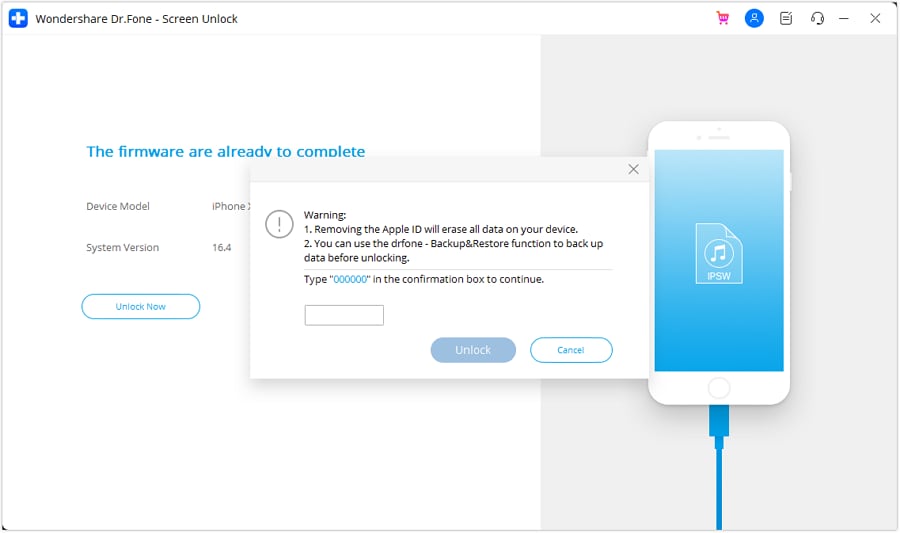
Part 2: 3 Methods To Change the Default Credit Card on Apple Pay
In our exploration of managing your credit card within the Apple ecosystem, we now focus on changing the default credit card linked to your Apple Pay. Apple Pay stands as a robust digital wallet solution, and understanding the process of updating your payment details is crucial for ensuring a secure user experience. Here, we will explore three approaches on how to change credit card on Apple Pay:
Method 1: Change the Default Card on the iPhone
We start by exploring how to change the default credit card on Apple Pay using your Apple iPhone 14. This method is particularly handy for iPhone users who want to ensure their preferred payment card is set as the default option. These are the instructions for setting a card as the default card for Apple Pay:
Instructions: On your Apple iPhone 14, access and open the Wallet app. Inside the app, locate the payment card you wish to set as your default. Touch and hold the selected payment card. Drag the card to the forefront, positioning it ahead of your other cards.

Method 2: Set New Card as Default on iPad or Mac
Whether you prefer using your iPad for managing your payment methods or you’re on your Mac, you can easily set a new card as the default option. Use the following instructions to set a credit card as the default card on Apple Pay:
For Mac
Instructions: Access System Settings through the Dock or Apple menu and move to Wallet & Apple Pay. Afterward, once you’re in Wallet & Apple Pay, choose a card from the “Default Card” settings and set it as the default card.

For iPad
Instructions: Navigate to Settings on your iPad and move to “Wallet & Apple Pay.” Here, scroll down to “Transaction Defaults” and press “Default Card.” Then, choose a card from the list to set it as your default card.

Method 3: Use Apple Watch to Change Default Card
The last stop on our journey to manage your default credit card on Apple Pay is the Apple Watch. If you are an Apple Watch user, then these instructions can assist you in how to change your credit card on Apple Pay:
Instructions: Access and launch the Apple Watch app on your Apple iPhone 14 and navigate the “My Watch” tab. There, tap on “Wallet & Apple Pay” within My Watch tab and scroll down in it to find the section labeled “Transaction Defaults.” In this section, you’ll find the “Default Card” option. Simply tap on it to select the card you wish to set as the default.

Conclusion
To summarize, we’ve navigated the complex world of how to change the credit card on Apple account. We’ve explored two critical aspects: changing the credit card on your Apple ID and altering the default credit card on Apple Pay. It’s important to understand that your credit card details for Apple ID and Apple Pay are distinct. Thus, it’s crucial to know how to update both to ensure a secure digital experience.
We explored many methods to change the credit card on Apple ID and Apple Pay, depending on your device and preference. Furthermore, there are unfortunate instances where you find yourself locked out of your Apple ID. For these, we introduced a valuable tool: Wondershare Dr.Fone - iOS Screen Unlock. This tool can efficiently unlock your Apple ID without causing any data loss, ensuring you can regain access to your account promptly.
Also read:
- [New] 2024 Approved Boosting Your Video Income on Youtube - Essentials
- [Updated] Horizontal Vs. Vertical Best for FB Videos, In 2024
- ABBYY Group's Latest Update: Insights From Ulf Persson, CEO, Regarding the Current COVID-19 Pandemic - Breaking News
- Conquer Job Interviews with Confidence & Excellence for 2024
- How To Bypass Google FRP on Infinix Hot 40 Pro
- How to Change Credit Card on Your Apple iPhone XS Apple ID and Apple Pay
- How to Change Lock Screen Wallpaper on ZTE Nubia Flip 5G
- How to Remove Apple iPhone 12 Pro Device from iCloud
- How To Reset the Security Questions of Your Apple ID On Your iPhone 11
- How To Unlink Your Apple iPhone 12 Pro From Your Apple ID
- In 2024, How To Remove Phone Number From Your Apple ID on Your Apple iPhone 11 Pro Max?
- In 2024, How to Unlock Apple ID On your Apple iPhone 12 Pro without Security Questions?
- In 2024, Is GSM Flasher ADB Legit? Full Review To Bypass Your Vivo S18 ProFRP Lock
- Mastering the Art of Interactive Narratives in Text-Based RPGs Using the AI Capabilities of ChatGPT
- Unveiling the World of Grok AI Through Elon's Insights Into Its Function and Cost
- Title: In 2024, How To Remove the Two Factor Authentication On iPhone 14
- Author: Alma
- Created at : 2024-10-12 21:40:40
- Updated at : 2024-10-15 05:17:38
- Link: https://apple-account.techidaily.com/in-2024-how-to-remove-the-two-factor-authentication-on-iphone-14-by-drfone-ios/
- License: This work is licensed under CC BY-NC-SA 4.0.

